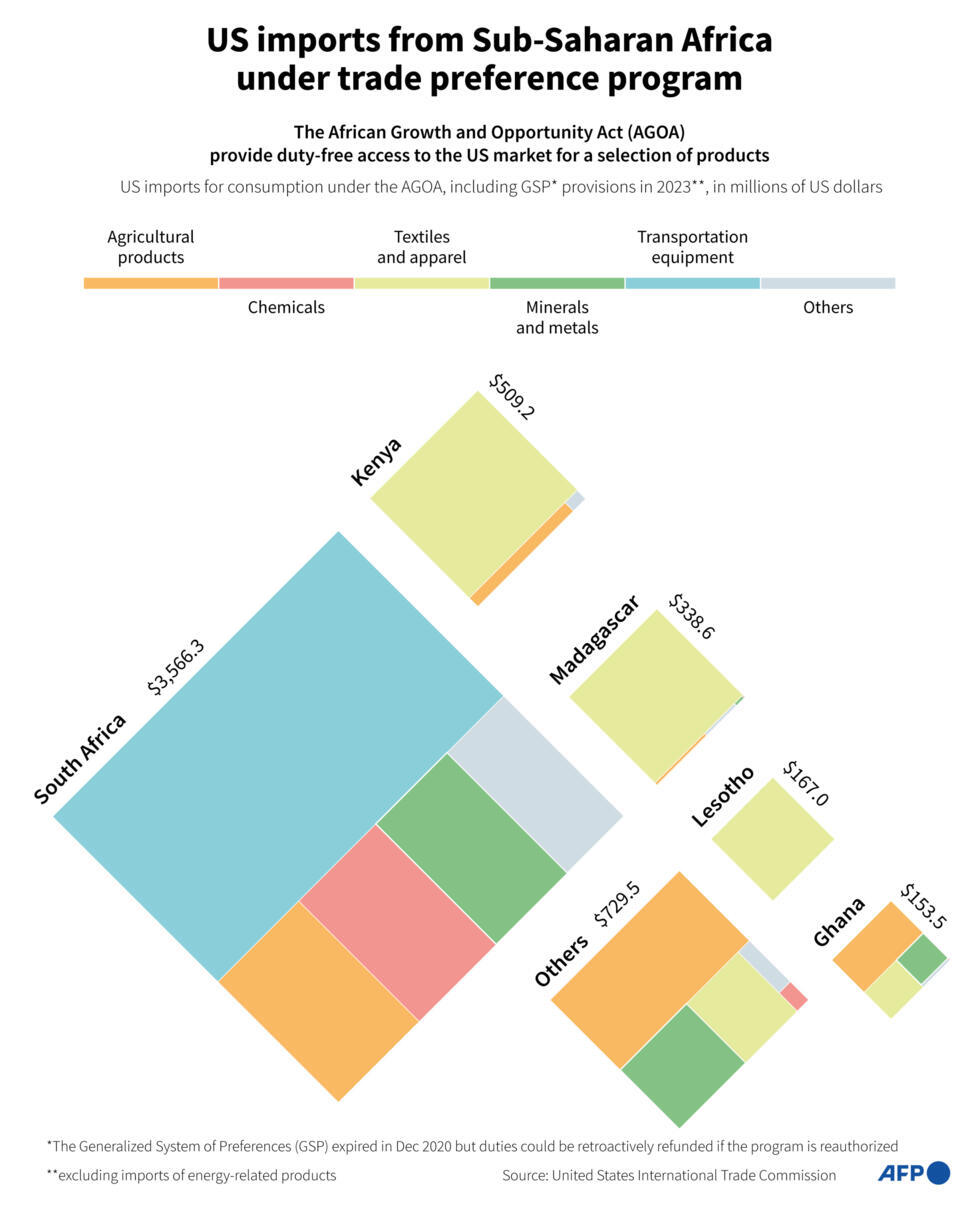The African Growth and Opportunity Act (AGOA), whose future is in doubt since Donald Trump returned to the White House, provides duty-free access to the United States for certain African products.
The accord is up for review in September and its disappearance could lead American importers to look for other sources.
The recent turmoil unleashed by Trump’s tariffs blitz has only added to the uncertainty over the fate of AGOA.
Preferential terms
The AGOA is a cornerstone of trading relations between the United States and African countries.
The preferential trading agreement was launched in 2000 under Democratic president Bill Clinton and allows duty-free access on certain conditions, including political pluralism, respect for human rights and the fight against corruption.
To date, some 30 of the 50 countries on the African continent benefit from the accord, which covers a wide range of products, from clothing to cars.
In 2023, $9.26 billion worth of goods were exported under the accord, of which $4.25 billion were products from the oil or energy sector, according to the United States International Trade Commission (USITC).
In the balance
Washington has not officially cancelled the AGOA, which is due for renewal in September, but there is “no clarity currently” on its status, director of the Africa programme at the Chatham House think tank, Alex Vines, told AFP.
“Given Trump’s scepticism of multilateral frameworks, AGOA’s continuation could be legitimately under threat,” Ronak Gopaldas, analyst at the Institute for Strategic Studies, Africa, wrote before Trump’s election.
It was last renewed in 2015 and, before the election, a cross-party law submitted in April proposed to renew it until 2041.
Under threat
If Trump decides to move against the AGOA he has several options.
He could simply not renew the accord in September, or just take out some countries such as South Africa, which he has targeted.
“President Trump could cite the clause in the AGOA, which says that beneficiaries have to maintain, or their activities have to be in line with US security and foreign policy interests,” said Richard Morrow, a researcher at The Brenthurst Foundation.
He could also exclude certain industrial sectors from the accord, such as cars, which he has often described as a “bellwether for the American economy”, he said.
Biggest beneficiary
South Africa is the biggest non-oil exporter in the accord, earning as much as $3.6 billion in 2023.
Within AGOA, Washington exempted South African cars from customs duties.
After precious metals, it is the country’s second biggest export earner to the United States, earning up to $1.88 billion, according to the South African tax authorities.
Not renewing AGOA could devastate the sector.
Billy Tom, president of the sector’s employers’ organisation, Naamsa, said 86,000 jobs are directly tied to the accord within car manufacturers, 125,000 when including their sub-contractors.
“I don’t think that South Africa has got a chance of the renewal” of AGOA, said Neil Diamond, president of the South African Chamber of Commerce in the United States.
The anti-Pretoria rhetoric has been led by Trump and South African native Elon Musk, the world’s richest man who dominates the president’s inner circle.
Washington has hit out at a recent South African expropriation law, which it claims discriminates against the white minority.
Pretoria has in particular come under fire from Washington for leading a case at the International Court of Justice accusing Israel of “genocidal” acts in its Gaza offensive, which Israel has denied.
Textiles, oil, farm products
In terms of non-oil exports, Kenya lags far behind South Africa with $509 million, followed by Madagascar with $339 million and Lesotho at $167 million, the three countries mainly selling textiles to the United States under the accord, according to the USITC.
Nigeria is the accord’s main oil and energy exporter, worth $3.7 billion in 2023.
Other countries, such as Ghana, mainly export farm products under the accord.
Do you think come September the AGOA agreement will be scrapped, revised or stay the same?
Let us know by leaving a comment below, or send a WhatsApp to 060 011 021 1
Subscribe to The South African website’s newsletters and follow us on WhatsApp, Facebook, X and Bluesky for the latest news.
By Garrin Lambley © Agence France-Presse
